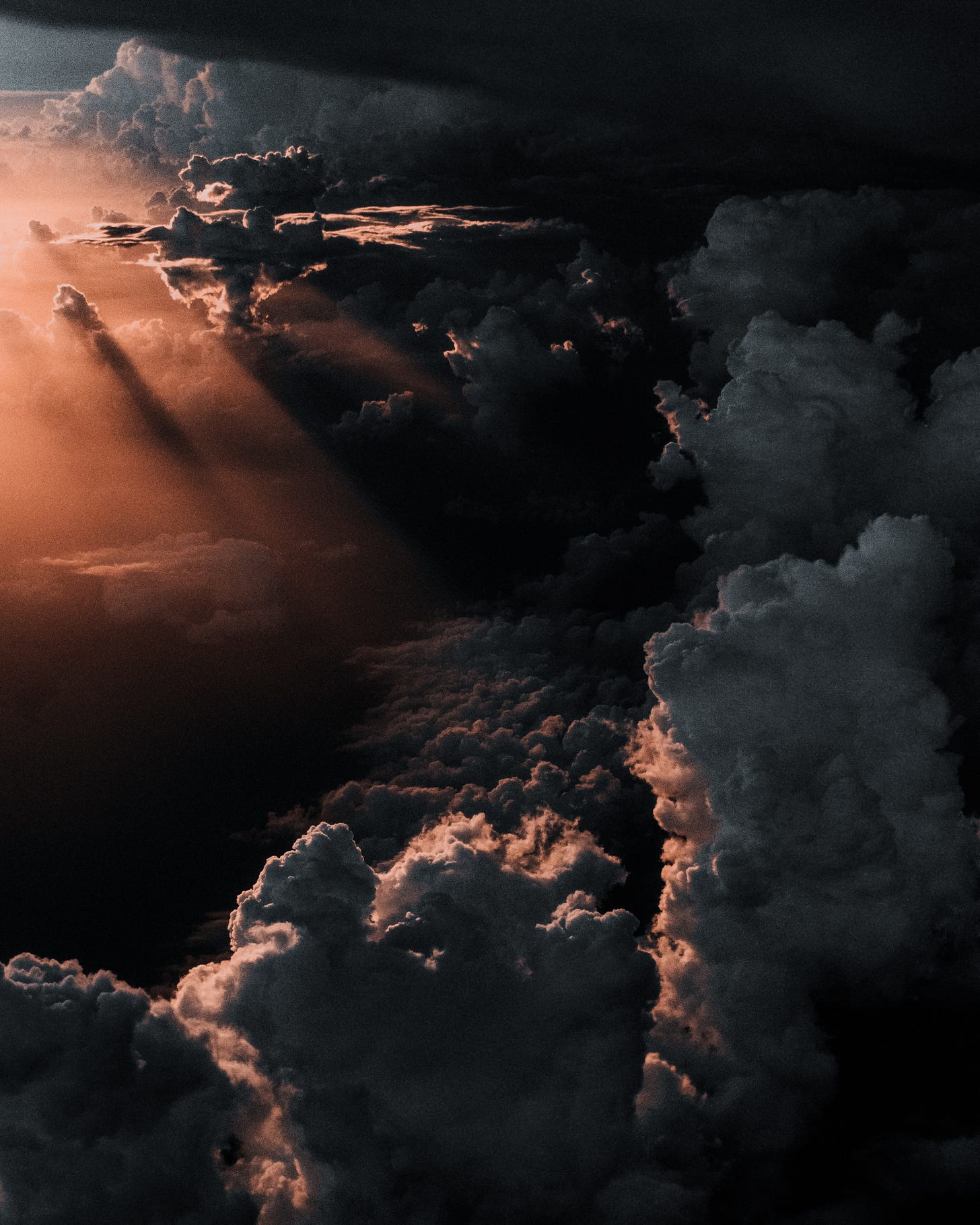Post nubila, Phoebus. In translation: after the clouds, the sun. A piece of ancient wisdom passed down—a note of simple optimism.
Which clouds? We are apt to think of the darkest clouds of our days. The storm clouds that blanket the sky with darkness - creating an impenetrable shroud. The light can be hard to find in those moments. No warmth. Whether it storms or not - the threat itself sends us inside ourselves. We are not safe. The world has lost its shine.
And hence the reminder of the proverb. The sun returns. After the clouds, the sun. No darkness is forever. No storm permanent. There is comfort to such simplicity.
But at what cost? Is this comfort too convenient? As all sayings are. Its truth is a little mischievous. This is only part of the story.
The darkest clouds of our days are not so easily erased. They return. They have a memory and rewrite the past we use to move us forward. But even that is not the whole story because the entire story has yet to be written. There is always another sun, another storm, and it will reshuffle the cards - past, present, future - nothing is ever settled.
But are dark and light the correct terms here? The sun's most brilliant rays can be so brief and fleeting - they recede. The storms are intense yet infrequent - we never have to hide for long.
And so I ask again: which clouds?
Most days, it is neither the darkness nor the brilliance - but something in between. A sky that is far more subtle - and playful. The sun peeks out at us from behind the clouds. It comes, and it goes - teasing and tempting us with its light.
It is as if the clouds and sun are dancing - and we, the spectators, are its muse. They move together and apart - in tandem and torment - one never really knowing the other but always connected. There are days when both will delight - and the days they cannot seem to agree.
These overcast days of dancing are often the most pleasant. There is a slight chill in the air, but the sun is still there, fighting its way through the density of the clouds.
What does it mean to say post nubila, phoebus in such instances? No straightforward before. No clear after. Just the dance.
What does this all mean for our living? Besides, of course, the reminder that when we look up each day, we are greeted with mystery and intrigue. It means that all life is living - as the poet said - that we sometimes have to recede, and other times we will have to shine. The world demands both from us.
It needs us in all our subtleties.
We must prepare for the veil. Every ray of light, just like every cloud, is passing the time as we are and moving toward its own uncertain future. It is all a movement. Not a straight line. Not even a circle. Life is far too subtle for the certainty of lines, but this movement has a form.
It is a song. If you listen close enough, you hear its drum beat in your body. You feel the notes - the high and low - and all the calm and climax of the melody we play.
Perhaps we are not their muse after all. We are the symphony - and they are dancing to us.
We are song. Living as one. And living together. Singing our solos and being part of the concert. A thousand different notes playing all at once - abrupt and steady. Notes that know no rest, existing, retreating, racing ahead, and slowing down to a quiet withdrawal. Their collision is creation—so many different clouds and suns at once.
After the clouds, the sun loses some of its simplicity. We cannot always say that it will be better. We cannot continuously insist that a favourable tomorrow is about to follow. There are so many clouds. Such different suns. A constantly shifting sky.
What becomes of harmony in such flux?
It arrives.
If we accept life in all the subtleties of uncertain skies, something happens to us - where clouds and sun are dancing to our song. I will listen to your song. You will listen to mine. Suddenly, even miraculously, some of the notes will seem to agree, and the melody suits us both; we sense that we could be the calm and the climax for one another and can dance as one - we discover our common sky, the single sun. We hold it close, embrace each minute, commit it to memory, and wonder aloud where the melody could take us now.




